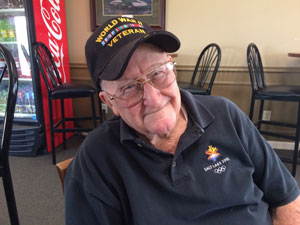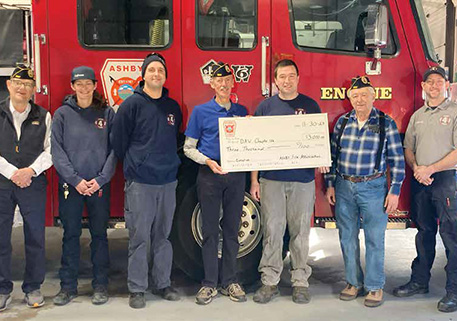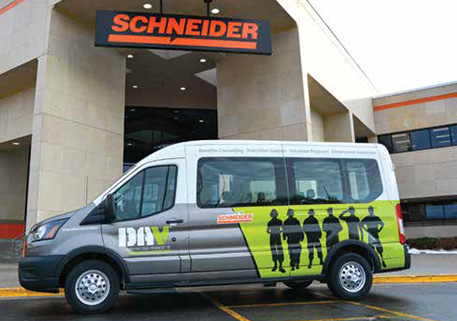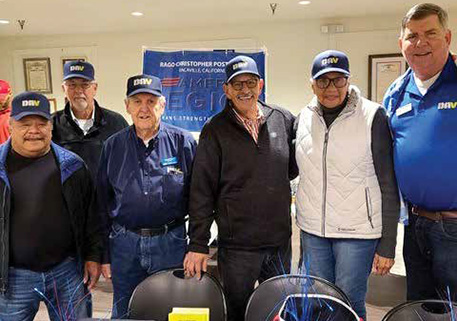
Four DAV advocates appeal WWII-era veteran’s claim decades after his injury flew under the radar.
94-year-old Oscar Masters will never forget training as a bombardier during World War II—especially the roaring noise of a B-17 Flying Fortress. It’s stayed with him for years.
After a 2005 VA disability claim came back denied, Masters wouldn’t take another swing at VA disability and compensation until meeting a DAV national service officer in 2016, launching an effort involving three other DAV officials to help Masters with an appeal.
Masters joined the Army Air Corps in 1943 after graduating from Herculaneum High School in his home state of Missouri. As the war raged in Europe and on islands in the Pacific, he trained stateside in B-17s and B-29s for bombing missions out of a pair of airfields, known today, as Ellsworth and Cannon Air Force Bases.
He was on orders to the Northern Mariana Islands when the war ended. And even though Masters never saw combat, his time flying simulated bombing missions took a toll.
“You could be sitting next to somebody, and you had to use your radio to talk. It was so noisy,” Masters said of flying in a B-17. A B-29 Superfortress by comparison, he said, was like “sitting in a living room.”
After the war ended, he moved to St. Louis where he got into the mining business, but the noise of a B-17 never left him.
Decades passed before he met DAV National Service Officer Michal Heitz, who approached Masters in 2016 at a golf course in Missouri after noticing the World War II veteran hat he was wearing.
“I asked him if he’s ever had anyone help him with his claim,” said Heitz. “He said, ‘Yeah, but I don’t worry about it, it’s not going anywhere.’”
“Well,” responded Heitz, “you’ve never had DAV represent you, let us have a look at it.”
After reviewing his case, Heitz found evidence of injuries sustained during flight. At one point, said Heitz, Masters had blood leaking from both ears.
Another claim was submitted only to be denied a second time in 2017. Heitz said that, according to the VA, there was no link between Masters’ service and his ear problems. That’s when National Service Officer Daniel Knabe, assistant supervisor for the St. Louis office, got involved with the appeal.
“When we write these up, we get into specific details, past court cases, and facts of law,” said Knabe. “I pointed out his military occupational specialty was known for exposure to noise trauma.”
Heitz periodically checked on its status, because, by then, he and Masters had forged a friendship through their mutual love of golf. And while Masters’ claim was far from a hole-in-one, it was approved March 5, 2019, and backdated to 2016.
“When they denied my claim I thought, well, that’s the end of it,” explained Masters. “But low and behold here comes this letter that they accepted it.”
In addition to Heitz and Knabe, DAV’s National Service Officer Thomas Harrington and Aaron Montague from the DAV National Appeals office in Washington, D.C., were involved in moving the case along for the deserving veteran.
“When people come to DAV, they don’t always realize they’re getting the experience of every advocate in an office and even experts throughout the region. We’re all talking. DAV represents them as a whole,” said Knabe.
“The more people who are involved in these cases, the more ideas and experience come to the table—this is usually the outcome.”
DAV’s National Service Director Jim Marszalek agrees.
“This really showcases what we bring to the table in terms of advocacy,” he said. “Coming together as a team is just one aspect DAV has to offer veterans from all eras.”
Masters shows no signs of slowing down, despite turning 95 in the fall, he’s often on the golf course or in the bowling alley, holding his own against younger contenders.
“I do alright for my age,” said a modest Masters.
The way Heitz puts it, “everyone knows Oscar on the golf course.”
“He’s one good golfer, too,” he added.






